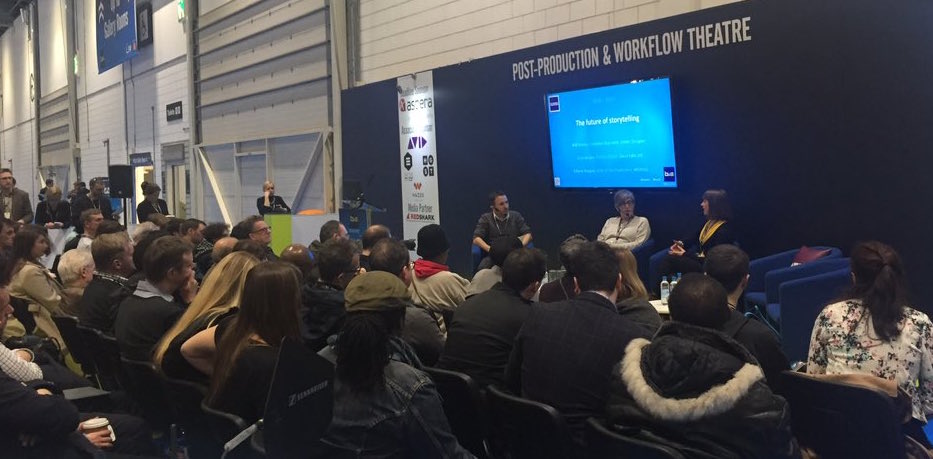
I had the pleasure of speaking on the future of storytelling panel at BVE 2016. It was the first time I’d done any public speaking since assembly when I was 14. Thankfully it went OK and
one month on, people are still talking to me about the subject.
Hosted by Avid, the session was included Will Strauss, myself and Ed Bengoa from MSV Post.
The future of storytelling is a hot topic and no wonder with the explosion of video content everywhere. The Post Production & Workflow Theatre was packed, with the debate carrying on at the end of the talk.
If you didn’t make it, or you didn’t get a seat, this is broadly what was talked about.
What came first – the technology or the story?
Is technology the catalyst to stories being told in different ways or are storytellers pushing advancements in technology? Ed’s experience as head of post at MSV is that clients push the technology, they want to make stories and Ed and her team find solutions to enable it.
Advances in technology has certainly led to stories being told, that would have previously have been impossible. I was at the BBC when the UGC department was set up. During the Arab Spring in Tehran, journalists were banned and user generated content became crucial.
More people are telling stories through video
as it becomes low cost and easy to do. But in this crowded arena, how are producers attracting attention to their video? One way is to raise the production values, viewers are demanding it and the trick is to find cost effective ways of doing it. Monetising video content has become part of the story. Viewers don’t necessarily want to see a 30 second ad at the start of a 2 minute video, so will we see ads becoming more intrinsic to the story with the growth of embedded ads, product placement, sponsorship and endorsements?
Will the platforms where stories can be told continue to grow?
Periscope for example has made storytelling more immediate and was used excitingly by Eddie Izzard on his marathons. Flixtra is the latest platform for monetising video, by distributing content as an app.
VR was a major talking point at BVE. Particularly with some high profile press releases from Facebook regarding the future of VR following their purchase of Oculus. It’s a concept that has been around for a while, but with such a major push,
will VR be the way we tell stories in the future?
How will this effect the way we tell them?
At this point, I quoted one of the scientists at the Foundry and described the vision of a colourist’s hamster wheel to grade VR video. Then described working in the cloud using VR. We could have virtual offices and meetings, be in 2 places at once. It’s a bit like teleporting. Thankfully it was getting close to the end of our allotted time.
Then Will asked whether in the future, we will need people to tell stories, or whether computers would tell them through metadata.
I think the reason people tell stories and listen to stories is to connect with other human beings
the human is the element that will never change in storytelling. Or as Ed said, they might, but they would be pretty boring stories.
I was asked to speak on this panel because the way Cloud Edits works is widely thought of as being the way that post-production will be carried out in future. The way we work here means that a more varied gene-pool of editors is available to create stories in our industry. Professionals who might otherwise have left to choose a more rewarding life than the 10 hour daily slog, with the 3 hour commute can offer. This can only enrich the stories being told. It also means that a wide variety of content producers have access to great editors, keeping production values on their stories high, whilst keeping the cost down.
However, I am not an expert on the subject, just merely offering my opinion. It would be great to hear what you think?
